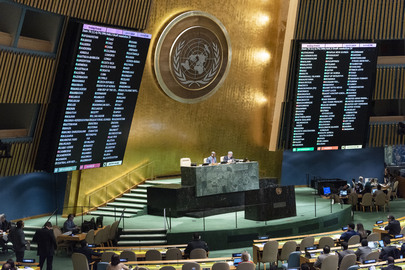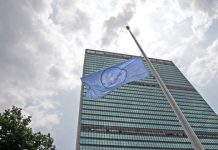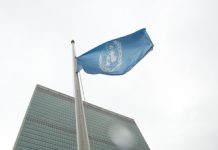The new Syria may fail if support lifeline is delayed: IOM chief
The head of the UN migration agency stressed on Friday that Syria is in no position to take back millions of its people following the fall of the Assad regime, while there is an urgent need to “re-evaluate” sanctions impacting the war-ravaged country.
Amy Pope, Director General of the International Organization for Migration (IOM), was speaking in Geneva, after returning from talks in Damascus with representatives of the caretaker authorities.
She said that 14 years of war in Syria had destroyed “hospitals, schools, community centres” and much else. “Rebuilding homes is just one part of the solution, but [Syrians] also need access to healthcare and essential services to feel secure and lay the foundations for recovery,” Ms. Pope insisted.
“What we see on the ground is that if there are overwhelming numbers of people who go home now into what is an incredibly fragile situation, it will overwhelm the country, and it could risk greater, more disruptive impact on a very fragile peace process.”
Three weeks since Hayat Tahrir al-Sham and other armed groups toppled the Assad regime, more than half of Syria’s population has been displaced, some 16.7 million people need humanitarian assistance and well over six million Syrian refugees have sought shelter abroad.
The IOM chief echoed an appeal by UN Secretary-General António Guterres for international solidarity with Syrians, “until conditions are met for all sanctions to be removed” by the Member States that imposed them, while also insisting on the urgent need to deliver humanitarian aid and support efforts to rebuild the economy.
Gaza has become a graveyard and there’s no escape, UN aid teams warn
Gaza has become “a graveyard” amid growing hunger, dire living conditions and ongoing hostilities, UN humanitarians warned on Friday.
Speaking from Nuseirat in central Gaza where heavy winter rains fell overnight, Louise Wateridge from the UN agency for Palestinian refugees (UNRWA), said that “over two million people are trapped” and “cannot escape”.
“It’s impossible for families to shelter in these conditions; most people are living under fabric, they don’t even have waterproof structures and 69 per cent of the buildings here have been damaged or destroyed. There’s absolutely nowhere for people to shelter from these elements.”
The development comes as the UN aid coordination office, OCHA, reported that the Israeli authorities had “denied another UN request to reach besieged areas of North Gaza governorate with food and water”. This has left Palestinians in Beit Hanoun, Beit Lahiya and parts of Jabalia “cut off from the essential assistance they need to survive”, OCHA noted.
Echoing those concerns, Rosalia Bollen from the UN Children’s Fund, UNICEF, said that winter has added to the misery in Gaza, where “96 per cent of women and children cannot meet their basic nutritional needs”:
“Children are cold, they’re wet, they’re barefoot; I see many children who still wear summer clothes and with cooking gas gone, there’s also lots of children, I see scavenging through piles of garbage looking for plastic they can burn.”
UN health experts judge risk to be ‘low’ from avian influenza
UN disease experts said on Friday that they judge the current risk from avian influenza to people to be “low”, although there is a “moderate” risk to people working with birds.
In an update, the World Health Organization (WHO) and Food and Agriculture Organization (FAO) confirmed that transmission between animals continues, along with “a growing yet still limited number of human infections”.
Avian influenza – which is also known as H5N1, or “bird flu” – is widespread in wild birds; it has caused outbreaks in poultry and dairy herds in the United States and elsewhere.
From January 2003 to November 2024, there have been around 1,000 reported cases of human infection with avian influenza virus from 24 countries. Of these cases, more than 460 were fatal.
“Sporadic” human cases of infection “are not unexpected”, according to the UN health agency but it said that “sustained human-to-human transmission of the currently circulating [avian influenza]” H5N1 virus is considered “unlikely”.
Daniel Johnson, UN News
Music composed and produced by Joachim Harris. All rights reserved
Source of original article: United Nations (news.un.org). Photo credit: UN. The content of this article does not necessarily reflect the views or opinion of Global Diaspora News (www.globaldiasporanews.com).
To submit your press release: (https://www.globaldiasporanews.com/pr).
To advertise on Global Diaspora News: (www.globaldiasporanews.com/ads).
Sign up to Global Diaspora News newsletter (https://www.globaldiasporanews.com/newsletter/) to start receiving updates and opportunities directly in your email inbox for free.

























